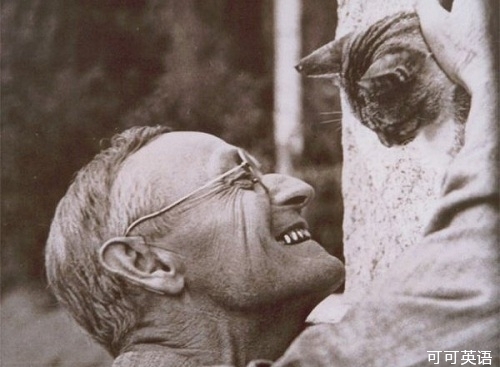(单词翻译:单击)
名著阅读
On one of these days, when so many went on a pilgrimage to the dying Buddha, Kamala also went to him, who used to be the most beautiful of the courtesans. A long time ago, she had retired from her previous life, had given her garden to the monks of Gotama as a gift, had taken her refuge in the teachings, was among the friends and benefactors of the pilgrims. Together with Siddhartha the boy, her son, she had gone on her way due to the news of the near death of Gotama, in simple clothes, on foot. With her little son, she was travelling by the river; but the boy had soon grown tired, desired to go back home, desired to rest, desired to eat, became disobedient and started whining.
Kamala often had to take a rest with him, he was accustomed to having his way against her, she had to feed him, had to comfort him, had to scold him. He did not comprehend why he had to to go on this exhausting and sad pilgrimage with his mother, to an unknown place, to a stranger, who was holy and about to die. So what if he died, how did this concern the boy?
The pilgrims were getting close to Vasudeva's ferry, when little Siddhartha once again forced his mother to rest. She, Kamala herself, had also become tired, and while the boy was chewing a banana, she crouched down on the ground, closed her eyes a bit, and rested. But suddenly, she uttered a wailing scream, the boy looked at her in fear and saw her face having grown pale from horror; and from under her dress, a small, black snake fled, by which Kamala had been bitten.
Hurriedly, they now both ran along the path, in order to reach people, and got near to the ferry, there Kamala collapsed, and was not able to go any further. But the boy started crying miserably, only interrupting it to kiss and hug his mother, and she also joined his loud screams for help, until the sound reached Vasudeva's ears, who stood at the ferry. Quickly, he came walking, took the woman on his arms, carried her into the boat, the boy ran along, and soon they all reached the hut, were Siddhartha stood by the stove and was just lighting the fire. He looked up and first saw the boy's face, which wondrously reminded him of something, like a warning to remember something he had forgotten. Then he saw Kamala, whom he instantly recognised, though she lay unconscious in the ferryman's arms, and now he knew that it was his own son, whose face had been such a warning reminder to him, and the heart stirred in his chest.
Kamala's wound was washed, but had already turned black and her body was swollen, she was made to drink a healing potion. Her consciousness returned, she lay on Siddhartha's bed in the hut and bent over her stood Siddhartha, who used to love her so much. It seemed like a dream to her; with a smile, she looked at her friend's face; just slowly she, realized her situation, remembered the bite, called timidly for the boy.
"He's with you, don't worry," said Siddhartha.
就在许许多多的人都去朝拜活佛的时候,一天,卡玛拉,当年那个美丽的名妓,也会朝拜活佛了。她早已摆脱了以往的生活,把她的花园送给了戈塔马的弟子们,信奉了戈塔马的学说,成了那些朝圣者的朋友和施主。一听说戈塔马病危的消息,她就和她的儿子小席特哈尔塔一起上了路,身穿简朴的衣服步行前往朝拜。余中,她带着儿子来到了这条河边。儿子累了,要回家,要休息,要吃饭,又哭又闹。
卡玛拉只好跟他频频地休息,孩子已经习惯了不听她的话而固执己见,她不得不喂他吃东西,哄他,呵斥他。孩子不明白干吗要跟随母亲踏上这艰苦和不幸的朝拜路,到一个陌生的地方去探望一个圣洁而垂危的陌生人。索性让他死掉好了,这跟孩子有什么相干呢?
这两个朝拜者已来到离瓦苏代瓦的渡船不远的地方,小席特哈尔塔又一次要求妈妈歇一歇。卡玛拉自己也累了,于是就让孩子吃香蕉,自己坐在地上,闭上眼歇一会儿。突然,她发出一声哀叫,孩子惊慌失措地瞧她,看见她脸色吓得惨白,从她的衣裙下钻了一条小黑蛇,逃走了,卡玛拉被它咬了。
他们俩赶紧往前跑,想找人求助,刚跑到渡船附近,卡玛拉就倒下了,再也跑不动了。孩子发出凄惨的叫喊,手忙脚知己地亲吻和拥抱母亲,而她也跟着大声呼救,声音传到了正站在渡船旁的瓦苏代瓦耳中。他迅速赶过来,抱起卡玛拉,放到船里,孩子也跟着上了船。过了一会儿,他们来到茅屋里,席特哈尔塔正在炉灶边生火。他抬起眼,先看到男孩的脸,这张脸使他惊讶地想起已经淡忘的往事。接着,他又看见了卡玛拉,而且马上就认出了她,尽管此记得她正不省人事地躺在船夫的臂弯里。他明白了,这男孩就是他的亲生儿子,孩子的脸貌提醒了他,他的心在胸中怦怦直跳。
卡玛拉的伤口被洗净了,但是已经发黑,身子也肿胀起来,于是,连忙给她灌药。好恢复了知觉,躺在茅屋里席特哈尔塔的床铺上,她深爱过的席特哈尔塔俯身看着她。她觉得这就像是一场梦,含笑望着这个昔日恋人的脸,慢慢才意识到自己眼前的处境,想起是被蛇咬了,便惊恐地呼唤孩子。
“他就在你身边,别担心。”席特哈尔塔说。
背景阅读

本书简介:
古印度贵族青年悉达多英俊聪慧,拥有人们羡慕的一切。为了追求心灵的安宁,他孤身一人展开了求道之旅。他在舍卫城聆听佛陀乔答摩宣讲教义,在繁华的大城中结识了名妓伽摩拉,并成为一名富商。心灵与肉体的享受达到顶峰,却让他对自己厌倦、鄙弃到极点。在与伽摩拉最后一次欢爱之后,他抛弃了自己所有世俗的一切,来到那河边,想结束自己的生命。在那最绝望的一刹那,他突然听到了生命之河永恒的声音……经过几乎一生的追求,悉达多终于体验到万事万物的圆融统一,所有生命的不可摧毁的本性,并最终将自我融入了瞬间的永恒之中。
作者简介:
赫尔曼·黑塞(Hermann Hesse,1877.7.2-1962.8.9)德国作家。1923年46岁入瑞士籍。1946年获诺贝尔文学奖。1962年于瑞士家中去世。爱好音乐与绘画,是一位漂泊、孤独、隐逸的诗人。黑塞的诗有很多充满了浪漫气息,从他的最初诗集《浪漫之歌》的书名,也可以看出他深受德国浪漫主义诗人的影响,以致后来被人称为“德国浪漫派最后的一个骑士”。主要作品有《彼得·卡门青》、《荒原狼》、《东方之行》、《玻璃球游戏》等。
主要生平及创作
出生于德国西南部的小城卡尔夫的一个牧师家庭。自幼在浓重的宗教气氛中长大,1891年,他通过“邦试”,考入毛尔布隆神学校。由于不堪忍受经院教育的摧残,半年后逃离学校。这期间他游历许多城市,从事过多种职业。
在比较广泛地接受东西方文化熏陶之后,1904年,黑塞发表了长篇小说《彼得·卡门青特》,一举成名,从此成为专业作家。这一年他与玛丽结婚,移居巴登湖畔,埋头写作,1906年发表了长篇小说《在轮下》。这一时期的创作以浪漫主义诗歌、田园诗风格的抒情小说和流浪汉小说为主,作品洋溢着对童年和乡土的思念之情,充满对广大自然和人类的爱,同时也表现了青年人的精神苦闷与追求。
第一次世界大战后,黑塞的创作发生了明显的变化,他醉心于尼采哲学,求助于印度佛教和中国的老庄哲学,并对荣格的精神分析产生了深厚的兴趣。他试图从宗教、哲学和心理学方面探索人类精神解放的途径。这时期的长篇小说有《克努尔普》(1916)、《德米安》(1919)、《席特哈尔塔》(1922)、《荒原狼》(1927)和《纳尔齐斯与歌尔德蒙》(1930)等。这些书深受西方读者的喜爱,得到极高的评价,其中《荒原狼》曾轰动欧美,被托马斯·曼誉为德国的《尤利西斯》。
30年代后,法西斯在德国猖獗,黑塞对社会前途陷入深深的怀疑与绝望之中,但他仍不倦地从东西方宗教与哲学中寻求理想世界,《东方之行》(1932)、《玻璃球游戏》(1943)正是这一时期追求与探索的结晶。
黑塞被雨果·巴尔称为德国浪漫派最后一位骑士,这说明他在艺术上深受浪漫主义诗歌的影响。他热爱大自然,厌倦都市文明,作品多采用象征手法,文笔优美细腻;由于受精神分析影响,他的作品着重在精神领域里进行挖掘探索,无畏而诚实地剖析内心,因此他的小说具有心理的深度。1946年,"由于他的富于灵感的作品具有遒劲的气势和洞察力,也为崇高的人道主义理想和高尚风格提供一个范例",黑塞获诺贝尔文学奖。


